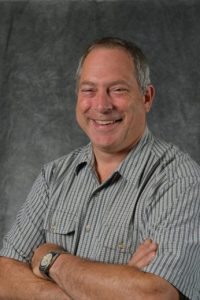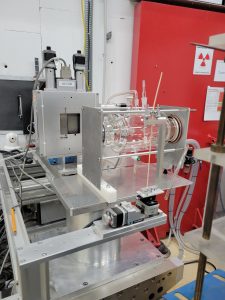James J. Noël, FECS
Associate Professor of Chemistry and
Affiliate Member of Surface Science Western
The University of Western Ontario
London, Canada
Date: April 17, 2024
Time: 1300–1400h ET
The unique properties of neutrons make them unmatched probes for materials science. Although they are particles, they have a wave-like nature, with wavelengths in the same range as x-ray wavelengths, and readily pass through solid matter. Like x-rays, they refract, diffract, and interfere constructively and destructively with each other. Unlike x-rays, which interact mainly with the electron clouds around the atoms of a material, through electromagnetic forces, neutrons interact mainly with atomic nuclei, through the strong nuclear force; consequently, they can also be used to determine a material’s composition, by both element and isotope. Neutrons interact with light elements as strongly as with heavy elements, sometimes even more strongly, and many possibilities exist for isotope labeling experiments. For example, neutron scattering techniques readily detect hydrogen, which is a difficult or impossible target for most other analytical methods. They also distinguish hydrogen from deuterium like night from day.
This webinar describes the combination of electrochemical measurements with neutron reflectometry, a surface analytical technique, to provide sub-nanometer scale compositional and structural information on electrode surfaces under electrochemical control that is unobtainable by any other means. Illustrative examples using neutron reflectometry to monitor oxide film growth and hydrogen absorption on titanium, zirconium, and copper are given.
An interactive Q&A session follows the presentation.
Benefits of attending the webinar
Learn about:
- The unique properties of neutrons that make them excellent probes for materials science;
- How neutron reflectometry can be combined with electrochemistry in situ;
- How to gain access to neutron beams for their own research.
James J. Noël
 Dr. James (Jamie) Noël is an electrochemist and corrosion scientist whose research includes studies of the degradation of nuclear fuel and container materials for permanent disposal of nuclear fuel waste. He leads a large and diverse research group which conducts experimental research on many aspects of the corrosion of copper, carbon steel, uranium dioxide, stainless steels, nickel alloys, and other materials. His industry research partners include the Nuclear Waste Management Organization (NWMO, Toronto), Swedish Nuclear Fuel and Waste Management Company (SKB, Sweden), National Cooperative for the Disposal of Radioactive Waste (Nagra, Switzerland), Nuclear Waste Management Organization of Japan (NUMO, Tokyo), Canadian Nuclear Laboratories (CNL, Chalk River), and others. Prof. Noël earned BS and MS degrees in Chemistry from the University of Guelph and a PhD in Chemistry from the University of Manitoba. He teaches ECS Fundamentals of Electrochemistry Short Courses at the Society’s biannual meetings, has been heavily involved with the ECS Corrosion Division and ECS Education Committee, and is an Associate Editor of CORROSION Journal. His awards include the ECS Canada Section R.C. Jacobsen and Lash Miller Awards, Fellow of The Electrochemical Society, and Western University Distinguished Research Professorship, Faculty Scholar Award, and Florence Bucke Science Prize. He has co-authored over 130 refereed journal articles, 50 refereed conference proceedings papers, 20 commercial reports, and five book chapters—and scattered a few neutrons along the way.
Dr. James (Jamie) Noël is an electrochemist and corrosion scientist whose research includes studies of the degradation of nuclear fuel and container materials for permanent disposal of nuclear fuel waste. He leads a large and diverse research group which conducts experimental research on many aspects of the corrosion of copper, carbon steel, uranium dioxide, stainless steels, nickel alloys, and other materials. His industry research partners include the Nuclear Waste Management Organization (NWMO, Toronto), Swedish Nuclear Fuel and Waste Management Company (SKB, Sweden), National Cooperative for the Disposal of Radioactive Waste (Nagra, Switzerland), Nuclear Waste Management Organization of Japan (NUMO, Tokyo), Canadian Nuclear Laboratories (CNL, Chalk River), and others. Prof. Noël earned BS and MS degrees in Chemistry from the University of Guelph and a PhD in Chemistry from the University of Manitoba. He teaches ECS Fundamentals of Electrochemistry Short Courses at the Society’s biannual meetings, has been heavily involved with the ECS Corrosion Division and ECS Education Committee, and is an Associate Editor of CORROSION Journal. His awards include the ECS Canada Section R.C. Jacobsen and Lash Miller Awards, Fellow of The Electrochemical Society, and Western University Distinguished Research Professorship, Faculty Scholar Award, and Florence Bucke Science Prize. He has co-authored over 130 refereed journal articles, 50 refereed conference proceedings papers, 20 commercial reports, and five book chapters—and scattered a few neutrons along the way.
Learn more about upcoming ECS Webinars and review our previous webinar recordings.
Interested in presenting in the ECS Webinar Series? Email your presentation title and abstract to education@electrochem.org for consideration.


